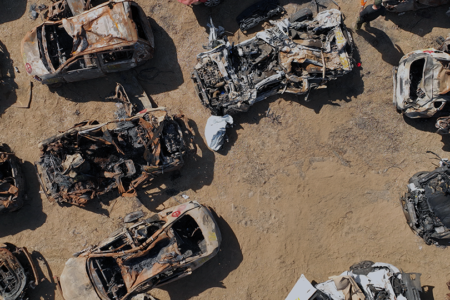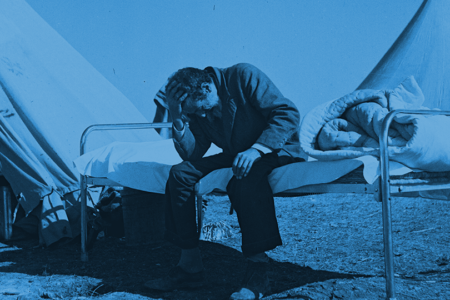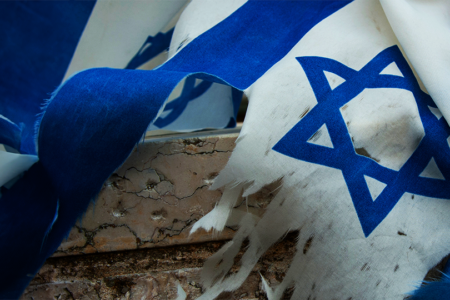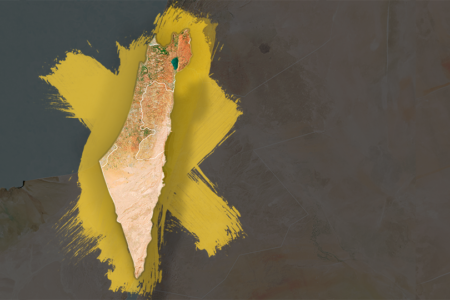Through A Glass Darkly
His arm moved slowly, deliberately toward the purple, blue and scarlet veil. For a brief instant he paused, just long enough to gaze at the beautifully embroidered cherubim. Like the rest of the tabernacle, they had been intricately patterned according to divine plan. With wings outspread they appeared as intended, like silent sentinels guarding the approach to the presence of God. Strange, he thought, his whole life had been directed toward this moment. He had trained and rehearsed times without number. With precision he knew exactly what he was to do. Still, he could not escape the awesome responsibility he felt. He was a direct and not far removed ancestor of Aaron, the brother of Moses. How many times had his father and grandfather told him of the Garden of Eden, of the forbidden tree, of the warning of punishment for disobedience? And Adam and Eve disobeyed. They ate—they knew sin—they were expelled from the Garden and separated from their Creator, and all of mankind with them. He had been told that the pomegranates hanging from his gown were a divine reminder of that first sin. The eating of the forbidden fruit. His head was pulsating—his mind was racing madly. A simple thought occurred to him : If man had never sinned, no sacrifice would ever have to be offered; if no sacrifice had been required, no priest would ever have to serve. His position carried with it great power and prestige—second only to the King—but he had not sought it. No man could. His was an appointed office—appointed by God himself (Heb. 5:1-4). There were times when he wished his lot had taken another turn. But they were short-lived. There could be no hesitation.
He parted the curtain and with the blood of a newly slain lamb held out before him, he entered the presence of the one true God who is a consuming fire (Deut. 4:24). He realized that Jehovah, before whose presence he now stood, was not capricious, vindictive or ruthless— a deity to be appeased. Rather, He was righteous, and that righteousness had to be satisfied if sinful man was to be restored to fellowship with his Creator and Sovereign.
This day he was to represent the whole assembly of Israel before their God (Ex. 19:6). He could never lose sight of that fact, for he bore each of the tribal names on his shoulders in onyx stones, and they were engraven in the twelve gems of his breastplate. At his consecration service blood was placed on his ear that he might hear and obey the divine injunctions, and that he might interpret them to the people. He had a bloodstained hand that he might execute, rightly and efficiently, the services of the sanctuary and the duties of his great office. His foot was bloodstained that he might walk in the statutes and commandments of the Lord blameless, and tread the courts of the Lord’s house as the obedient servant of El EIyon—the Most High God (Lev. 8:23, 24).
The odor from the altar of incense filled his nostrils—but he was glad that it was there, for it served to keep him from looking on the visible presence of the glory of God. No man can look upon God and live (Ex. 33:20). His personal danger was amplified by the soft clatter of the bells on the bottom of the flowing gown which he wore. He knew full well that the congregation waited anxiously without the tabernacle. As long as they heard the bells, all was well. If the bells ceased, the people realized that something had gone wrong. Israel knew that the way to God was prescribed and precise—any deviation would bring death.
Slowly he moved toward the Ark of the Covenant. Its dimensions, materials and appearance were known to him. The cherubim above the Ark, like those embroidered on the veil, were guardians of the divine holiness. Within the Ark was Aaron’s rod, the table of the Law and manna. Did they perhaps speak of God’s redemption from Egypt, direction for the journey and provision along the way? Carefully he began to sprinkle the blood of the sin offering which he had carried with him. Seven times, indicating perfection, he sprinkled the blood before the mercy seat, thus symbolically covering the sins of the people from the eyes of the Lord who dwelt between the cherubim (Psalm 80:1).
Stiff to be done, he must intercede for his people (Heb. 7:25) and bless them (Lev. 9:22-24). But with the propitiatory sacrifice completed, he began to retrace his steps. Totally spent, emotionally drained, he again parted the curtain, and this time stepped from the Holy of Holies into the Holy Place. Another Yom Kippur (Day of Atonement) would soon be history. As high priest of the whole house of Israel, he had satisfactorily performed his duties. The sins of the entire nation had been covered for another year through the shed blood of a spotless lamb.
As he made his way out to the waiting multitude, one gnawing question fleetingly crossed his mind—what did father Abraham mean when he said, “. . . God will provide himself a lamb” (Gen. 22:8)?*
*The answer, lie conjectured, would have to await additional divine revelation. For the present, he could only see through a glass darkly (1 Cor 12:12).






